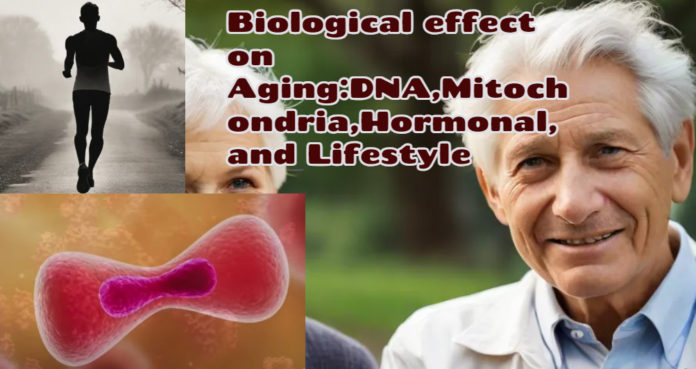Growing old is a biological process that goes with life and all forms of living organisms. Although people imagine the ageing process as a set of rather obvious transformations, including wrinkles, grey hair, and baldness, the process, including underlying biochemical processes, is much more layered and intricate.
Gaining knowledge about aging on the bodily level may yield significant information regarding alteration of the human body and the ways to maintain good health in older age. Here in this article, we will discuss what is bioaging, what are the causes that can affect the ageing process, as well as the ways to enhance the longevity and quality of life.
What is aging?
Wear and tear is the common term used for aging, which is the process that takes place in living organisms as they reach the advanced age of their lives. This process is genotypic as well as phenotypic in nature. The process is unique to every person, but there are general changes that take place in the human body.
The Role of DNA and Genetics
Several complex factors come into consideration, including the genetic makeup of an individual and his or her overall mileage, which is age. During successive divisions, the DNA replicates, and there can be errors and mutations that, if they occur, can pile up and cause harm to the cell. A cell’s telomeres, or the ends of the chromosomes, become progressively shorter each time the cell divides, and when they reach a certain length, the cell can no longer divide, and this process is known as cellular senescence. This shortening is known to play a significant role in the process of aging.
Oxidative Stress and Free Radicals
The oxidative stress is therefore defined as the state where there is an increased generation of free radicals within the body and a decreased generation of antioxidants. Some are generated internally in the process of metabolism, while others are generated from external influences like pollution, radiation, and smoke, among others. It is also important to know that free radicals, accumulating their harm in the body over time, can lead to aging and the development of age-related diseases such as heart disease, diabetes, or cancer.
The Impact of Cellular Senescence
Cell aging or senescence, is a condition whereby cells cease to proliferate and become secrete aging-associated cytokines. It is important to note that senescence can be considered as an anti-tumorigenic mechanism. However, an accumulation of SEN accumulation in tissues over time leads to deterioration of tissue function, which is characteristic for age-associated pathologies. Here, the cells are senescent which are involved in chronic inflammation, tissue deterioration and a compromised regenerative ability, hence causing aging.
The Role of Mitochondria
Essentially, the mitochondria in each of the cells are responsible for generating energy. Nonetheless, failure in mitochondrial function is observed with age. This consequently reduces the energy generation and increases free radical generation. This reduction in mitochondrial efficiency is correlated with numerous disorders that are associated with aging. Such as neurodegenerative diseases, muscle atrophy and metabolic syndromes.
Hormonal Changes and Aging
Endocrine glands are involved in the regulation of most body activities. And they secrete hormones, which in turn change with age. For instance, reduction of estrogen and testosterone during menopausal and andropausal periods causes alterations in bone density, muscularity, and adipose tissue. Besides, growth hormone secretion as well as melatonin production decline, influencing the sleep-wake cycle and metabolic processes.
Lifestyle Factors Influencing Aging
The tendency for aging is genetically determined, however, there is evidence on how we age. This is due to our lifestyle, the food we take, exercise, or even how we handle stress. Consumption of foods that are rich in antioxidants, exercise, and sufficient sleep reduces some of the biomarkers that come with ageing. Also, one should quit smoking, limit alcohol, and minimize the amount of stress to have healthy aging.
Also read: Top Exercises for a Complete Workout: Effective Routines for Home, Office and Gym
Strategies for Promoting Healthy Aging
Promoting healthy aging involves adopting lifestyle habits that support overall well-being and mitigate the biological effects of aging. Some strategies include:
- Balanced Diet: Consuming a diet rich in fruits, vegetables, whole grains, and lean proteins can provide essential nutrients and antioxidants that combat oxidative stress.
- Regular Exercise: Engaging in regular physical activity helps maintain muscle mass, bone density, and cardiovascular health.
- Adequate Sleep: Prioritizing sleep supports hormone regulation, cellular repair, and cognitive function.
- Stress Management: Practicing mindfulness, meditation, and other stress-reduction techniques can lower inflammation and support mental health.
- Avoiding Harmful Habits: Avoiding smoking and excessive alcohol consumption reduces the risk of age-related diseases.
Aging is the time-related deterioration of the physiological functions necessary for survival and fertility. While we cannot stop aging, understanding the underlying mechanisms allows us to adopt lifestyle habits. That promote healthy aging and enhance our quality of life. We can support our bodies as they age, potentially extending our years of vitality and well-being.
Frequently Asked Questions (FAQs)
1. Can aging slow down?
While aging is inevitable, certain lifestyle choices can slow down the effects of aging and promote longevity.
2. What are the most common age-related diseases?
Common age-related diseases include heart disease, diabetes, Alzheimer’s disease, and osteoporosis.
3. How do antioxidants help with aging?
Antioxidants neutralize free radicals, reducing oxidative stress and potentially slowing the aging process.
4. Is there a genetic component to aging?
Yes, genetics play a significant role in aging, but environmental factors and lifestyle choices also have a substantial impact.

